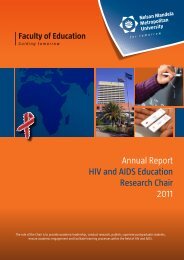USING A DIFFERENT LENS FOR HIV and AIDS EDUCATION ...
USING A DIFFERENT LENS FOR HIV and AIDS EDUCATION ...
USING A DIFFERENT LENS FOR HIV and AIDS EDUCATION ...
Create successful ePaper yourself
Turn your PDF publications into a flip-book with our unique Google optimized e-Paper software.
elationships. This view is highly problematic<br />
as it makes young people unable to create<br />
opportunities of building trusting relationships<br />
based on mutual respect <strong>and</strong> love. Instead of<br />
celebrating youth sexuality, society shuns it.<br />
This is the same when it comes to religion.<br />
Religion is used quite instrumental in punishing<br />
<strong>and</strong> placing young people in judgement.<br />
Through religion young people are supposedly<br />
being protected by being told not to engage in<br />
any sexual relationships. The effects of this<br />
push by religious institutions often results in<br />
unintended consequences where young<br />
people end up engaging in reckless sexual<br />
activities in fear of being caught.<br />
Youth sexuality is often<br />
disregarded <strong>and</strong> not<br />
respected by adults...<br />
Religion, however, can also offer many<br />
opportunities for healthy sexual relationships.<br />
If religion is used appropriately to encourage<br />
young people to live responsibly, it can<br />
provide a better platform for youth sexuality<br />
to be celebrated. There‟s also much that can<br />
be done to support young people <strong>and</strong> parents<br />
27<br />
in ensuring safer sexual relationships among<br />
youth. One of the ways in which this can be<br />
achieved is through community recreational<br />
activities. If young people are afforded<br />
opportunities to engage in interesting activities<br />
such as sport <strong>and</strong> dance, their energies may be<br />
channelled away from sex. Community<br />
networking among parents may also be helpful<br />
where parents can discuss the challenges their<br />
children face <strong>and</strong> get advice from other<br />
parents. This creates joint responsibility<br />
among parents, <strong>and</strong> may sway parents from<br />
the rigid <strong>and</strong> stereotypical underst<strong>and</strong>ing of<br />
youth sexuality. Finally, this may also allow for<br />
open communication between the parent <strong>and</strong><br />
the young person, creating the opportunity to<br />
share with the parents whatever it is the<br />
young person may want to share. While it is<br />
acknowledged that young people are faced<br />
with many pressures while growing up, not<br />
least the pressures they often receive from<br />
their peers, it is important for parents not to<br />
be seen as the solution to youth challenges.<br />
Such an approach takes away the agency of<br />
young people. Many young people do resist<br />
the pressures <strong>and</strong> are able to negotiate their<br />
own lives in meaningful <strong>and</strong> responsible ways.<br />
The role of parents needs to be more of<br />
support as opposed to authoritarian guidance.<br />
Thabo Msibi



